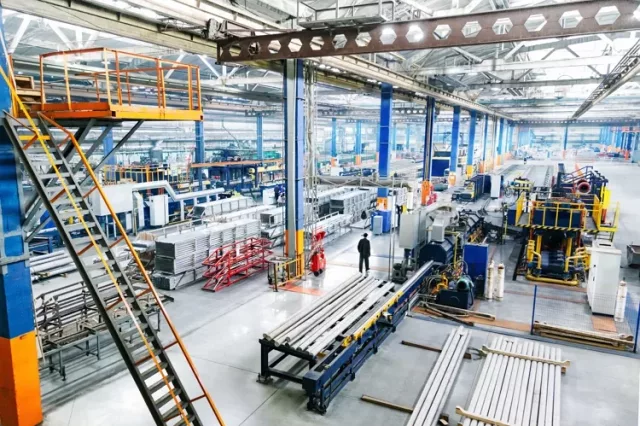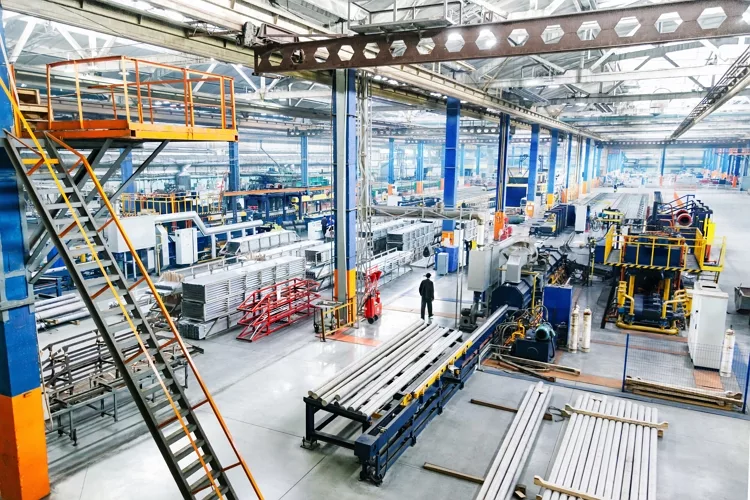Insights from Your Trusted Manufacturing ERP Solutions Experts
Enterprise applications have been an integral part of manufacturing businesses for the last several decades. However, the new genre of applications has a certain “intelligence” that most legacy systems cannot deliver. Whether it is an ERP, CRM, Finance, HR, or Marketing Automation solution, the current lot of “intelligent” applications are driving digital transformation by streamlining business operations and driving growth and profitability like never before. If your organization is looking to make a mark in the highly competitive manufacturing landscape, new-age manufacturing ERP solutions, such as SAGE X3 can help you take your business to the next level and stay ahead of the curve.
Read on to learn how to identify and use a robust manufacturing ERP solution to drive digital transformation and shift gears from an era of automation to an era of optimization.
Top Factors for Evaluating a Suitable ERP Solution for Your Manufacturing Business
Here are the key considerations and questions to ask while choosing a suitable manufacturing ERP solution for your business.
- Is it solving complex optimization problems and enabling advance planning?
As a business owner or lead decision maker, you understand that true optimization is about enabling an advanced planning mechanism that empowers your employees and operators to make quick and efficient decisions. And yet, this process can be an extremely complex one. However, the modern, business intelligence-led ERP solutions allow planning to be highly optimized by analyzing the data across different functions, such as finance, supply chain management, and distribution logistics. - Does it maximize the efficiency of your shop floor processes?
Often, sophisticated technology investments stop at the shopfloor or exclude some of the significant manual activities involved on the shopfloor. Hence, it is important to ensure a holistic manufacturing ERP implementation that integrates and unifies all the sub-processes and eliminates existing inefficiencies on the shopfloor. Ultimately, your ERP solutions should work to reduce production times, make a better product than your competition, increase your speed to market, and keep your costs and wastages low. - Is it enabling smart manufacturing?
No matter which manufacturing ERP solution you choose for your manufacturing business, the key is to have access to it anytime, anywhere with a range of deployment options and mobile access. Simple interfaces and easy web-based access allows relevant personnel to have proper control and oversight of the manufacturing processes through any connected devices. All cloud-based ERP solutions can run on digital devices, such as tablets, iPads, or smartphones, allowing easy data capture right at the shopfloor level. - Is your ERP empowering your company to be cloud-ready without concerns of risk and availability?
Technology experts truly believe that the future is cloud computing, and there is enough evidence to see that this is already happening. In-house data storage and massive data centers may seem to offer better availability and control on the surface. But the fact is that storing huge amounts of data on the cloud is far more secure and cost-effective than allowing it to sit on servers, whether at your business premises or a storage service vendor’s offsite servers. You can always scale up the computing capacity based on business growth and organizational priorities. The key is to invest in an ERP solution that offers easy data access and availability and has a proven track record for data security. - Are you able to accomplish enterprise-wide backward and forward traceability?
Establishing accountability and ownership is an integral aspect of elevating your product quality. This is where your ERP’s traceability functionality comes in. Since the ERP allows data storage across the supply chain, you can trace all the details of any lots affected by quality control or product defect issues in your production processes. Your ERP solution should have the capability to run a traceability inquiry upstream or downstream by batch, by part, or any other granular level detail. Traceability also helps manufacturing organizations in pegging, (requirement origin), change control management, and quality assurance. Hence, take the time to evaluate what kind of backward and forward traceability your chosen ERP solution provides. - Is your ERP adaptable to your overall business and IT strategies?
Your ERP software should be adaptable in order to help you leverage the key business functions in your organization. It should also take into account the nuances or complexities in your already established, proven processes. While adaptability with your business or IT strategies is an essential offering of a robust manufacturing ERP system or platform, it is important not to go overboard on customizations. Remember that over customizations may not support auto system upgrades or will instead need excessive and laborious reviewing and testing during such upgrades. - Does your ERP solution check all the boxes for regulatory compliance and reporting? Are you customizing your business to fit your ERP or is it the other way around?
Your manufacturing ERP system must help you remain compliant with all applicable regulatory compliance and reporting requirements across geographies and currencies. Hence, look for a solution that navigates and guides you through the huge and complex maze of global laws and restrictions. - Is your business digitally enabled to electronically take orders from your customers and communicate them to the suppliers?
Imagine how efficient it would be if your business could take electronic orders from your customers and communicate them to the suppliers almost on a real-time basis. Choosing the appropriate manufacturing ERP solution is about empowering the relevant stakeholders to take complete control and ownership of the business for their respective domains. Whether it is your Finance, HR, production, supply chain, logistics, marketing, sales, or the service teams, an integrated manufacturing ERP solution will provide innumerable benefits for every function. This includes process optimization, collaboration, minimization of errors or rework, and seamless communication and experience for the customers and employees. Today, many ERP vendors support Software-as-a-service (SaaS) by building out their infrastructure and service platforms. This not only helps in digitizing the supplier management, but will also enhance your workforce engagement and customer experiences. - What is the cost of inaction to switch to a better ERP solution?
Many organizations put off ERP implementations due to a number of reasons, including resistance to change, unplanned expenses, budget constraints, inadequate sponsorship, unrealistic time and cost expectations and more. However, the actual cost of inaction in digital transformation or in switching from a legacy system could be much more than you think. Besides the staggering cost of maintaining, out-of-date systems, you may end up losing visibility and control over critical or time-sensitive business decisions, which could eventually lead to loss of talent, customers, and profitability.
A Comprehensive Approach to Adopting ERP for Manufacturing
Global environmental and political dynamics, including trade wars or sanctions can have a real impact on your business. Creating a smart, digital environment will help you respond to the changing markets almost on a real-time basis, so that your business is not marginalized in the competitive landscape. This means looking for solutions and applications that offer issue identification, inventory cost management, price modeling and transaction capabilities, and superior data access, extraction, and reporting. The functionalities should also include improved workforce scheduling and resource utilization, flexibilities in production scheduling, comprehensive regulatory compliance, enhanced customer insights, and greater standardization across divisions. In addition, it is important to approach the process of ERP selection and implementation to match your business size. While smaller organizations can afford to seek more tactical solutions that focus on improving certain core processes, larger, global, multi-location organizations need a more strategic approach and solutions that can scale up to match their business growth.
Experienced tech experts always advise businesses to look at ERP solutions holistically. To do this, all your key stakeholders need to define success for their respective businesses or functions, as well as collectively for the organization as a whole. To take it a step further, list the parameters that measure success, identify and prioritize the pain points, and review opportunities for improvement that may be realized with the implementation of your chosen ERP solution.
What to Expect with SAGE X3? Is it the Right Solution for Your Organization?
SAGE X3 is a powerful manufacturing ERP solution that supports and empowers your business processes to help your organization become more agile, efficient and profitable. Here are some of the highlights of SAGE X3 manufacturing ERP solutions:
- Complete integration between sales, finance, supply chain, and customer services with seamless flow of data and intelligent information across functions and teams
- Forward and backward traceability as well as streamlined processes that ensure quality from start to finish
- Excellent support and guidance to achieve complete regulatory compliance across geographies and currencies
- Intelligent features that support planning, scheduling, tracking, and reporting across all your processes and sub-processes.
So, what exactly does SAGE X3 bring to your business?
- Complete visibility and control over internal operations and costs which strengthens business decisions related to local manufacturing issues, raw material price fluctuations, global currency fluctuations, and other significant manufacturing challenges.
- You and your executive leaders can respond faster to shifts in consumer demands, while managing any instabilities in the purchase, production, shipping, or other specific issues related to your organization.
- Greater product and process consistency that minimizes the risk or scope of product recalls, while allowing you the flexibility to leverage every available opportunity for improvement.
- Rapid deployment, simplified management, easy web-based connectivity and access, and powerful options and variants for configuring and customizing the ERP solution for your manufacturing business.
- Versatile and flexible capabilities, specifically designed for manufacturing, including:
- Production management methods by order, job or inventory
- Automated finite capacity planning
- Extensive lot, sub lot and serial number traceability
- Bill of materials management with a component by date
- Work order release management
- Product configurator, variants and options
With SAGE X3, expect nothing less than complete responsiveness, excellent product and process consistency, unparalleled global compliance, and exceptional ease of access.
Improve Business Efficiencies and Scale with the Powerful Manufacturing ERP Solution, SAGE X3
At Panni, our enterprise consulting services have helped numerous businesses across industries in the selection and implementation of robust ERP solutions. We have the experience and expertise in deploying SAGE X3 manufacturing ERP solutions for both discrete and process manufacturing industries to enable end-to-end digital transformations.
From finance management, supply chain management and manufacturing, to administration and support, mobile web apps, and cloud connectivity, we can help you implement ERP solutions for any or all areas of your organization. Our qualified professionals will work closely with you and your leaders for enabling digital transformation in your manufacturing organization by
- Developing a business case for an advanced, intelligent manufacturing ERP solution
- Creating a technology map in keeping with your business goals and budget
- Designing a performance metrics or a benefits realization plan
- Providing assistance in all aspects of the ERP customization, implementation, and deployment



